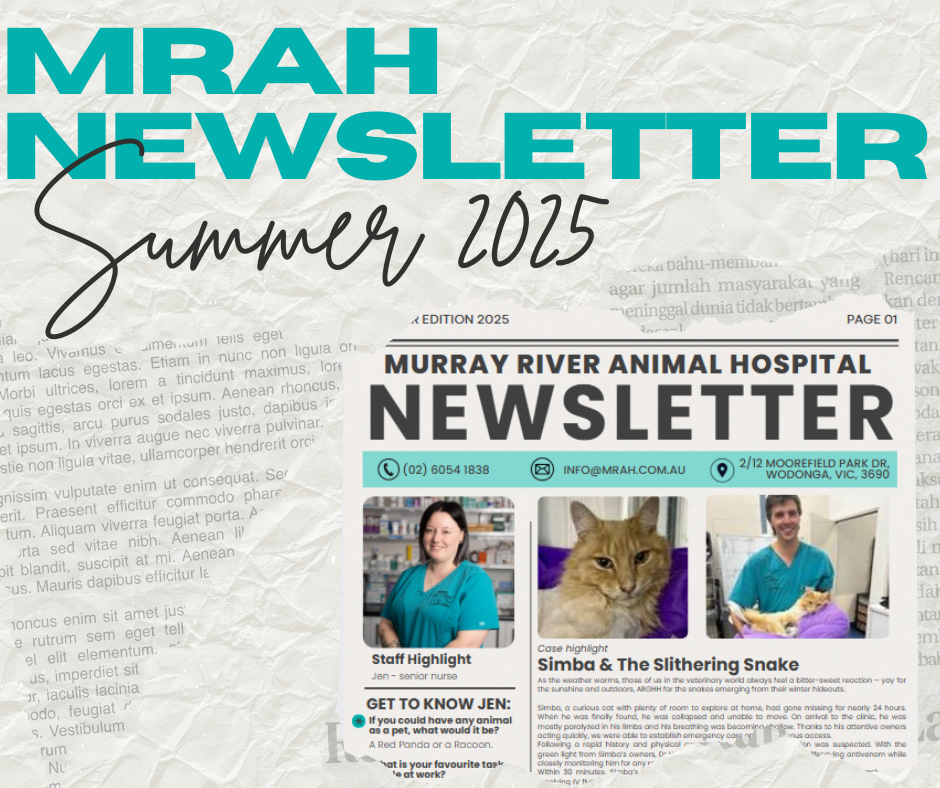What To Do Before Pet Surgery: What Albury-Wodonga Pet Owners Need to Know
From desexing to dental care, pet surgery requires the right prep. Get Albury–Wodonga tips for a smooth pet surgery experience and proper aftercare.
.png)
Preparing Your Pet for Surgery: What Albury-Wodonga Pet Owners Need to Know
If you have any concerns please call (02) 6054-1838
Surgery—whether it’s a routine desexing or something more complex—can be a stressful time for both pets and their humans. At Murray River Animal Hospital, we want our Albury-Wodonga pet families to feel confident and informed every step of the way.
Here’s everything you need to know to help your furry friend prepare for a safe and successful surgery.
1. Understand Why the Surgery Is Needed
The first step is understanding why your pet needs surgery. Common procedures we perform include:
- Desexing (speying or neutering)
- Lump removals
- Dental surgery
- Bladder surgery
- Organ biopsy
- Emergency procedures (e.g. foreign body removal)
- Diagnostic imaging (e.g. abdominal ultrasound, echocardiogram, X-rays)
If you’re unsure or have questions, just ask. Our team is always happy to explain your pet’s condition, the procedure, and any potential risks, so you feel confident in their care.
2. Pre-Surgery Fasting
In most cases, a modified fast is recommended before surgery to reduce the risk of vomiting under anaesthetic.
If your pet normally eats breakfast, they're allowed only ¼ of their usual morning meal. If your pet takes medication in the morning, this should still be given with the reduced breakfast as usual.
It is essential that your pet has no access to food overnight. Water is generally fine until the morning.
We'll also discuss your pet’s recent food and medication intake during the admission appointment to ensure everything is on track for a safe procedure.
3. Keep Your Pet Calm and Secure
On the morning of surgery, keep your pet as calm and relaxed as possible—no big walks or high-energy play. Bring dogs on a secure leash and cats or small pets in a sturdy carrier.
Please allow plenty of time to stay with your pet during admission. The nurses or vets will go over the details of the procedure and get written consent. After a gentle assessment, your vet will give your pet a calming injection while you stay by their side.
We keep the lights dim and noise levels low to minimise stress. Once your pet is resting comfortably (usually within 10–30 minutes), we’ll place an IV cannula into their vein so we can safely administer IV fluids and the induction anaesthetic.
Having you present during this stage helps to keep your pet calm, reduces the need for additional medications, and improves anaesthetic safety overall—a key benefit of our Stress Free Certified clinic, something not offered in most veterinary practices.
4. Bring the Essentials
Pack any medications your pet is currently taking and let the vet know when they were last given. You can also bring:
- A familiar blanket or toy for comfort
- A written list of questions
- Emergency contact info
5. Aftercare Is Key
Post-surgery care is just as important as the procedure itself. Your vet will provide personalised aftercare instructions, but here are a few essentials:
- Rest and restricted movement – Prevent running, jumping, or rough play to allow proper healing.
- Pain relief – Always give medications exactly as prescribed, even if your pet appears to be feeling better.
- Monitor the incision site – Keep an eye out for redness, swelling, discharge, or signs of discomfort.
- Prevent licking or chewing – Use a recovery suit or an e-collar (cone) if needed to protect the surgical area.
- Keep them warm – After surgery, pets can’t regulate their body temperature as well. Make sure they sleep in a warm, sheltered spot. If your pet doesn’t normally sleep indoors, a laundry or garage setup with blankets can work well during recovery.
If anything doesn’t seem right, contact your vet straight away. We’re here to help you every step of the way.
6. Follow-Up Appointments
Your pet will need a follow-up visit to check healing and, if required, remove stitches. This appointment is booked at the time of discharge and is essential to ensure everything is healing as expected.
If you're travelling from Wodonga, Lavington, Thurgoona, or other nearby areas, let us know—we're happy to coordinate a time that suits your schedule.
7. Emotional Support Matters
Pets can feel groggy, confused, or clingy after surgery. Give them lots of love and reassurance during recovery—but also honour their need for rest.
Each pet is different, and it’s normal for some to bounce back quickly, while others need a few quiet days to regain their energy.
Final Thoughts
Surgery can be nerve-wracking, but with the right preparation and support, your pet is in safe hands. At Murray River Animal Hospital, we treat every patient like one of our own, with expert care and genuine compassion.
📍 Based in Wodonga and caring for pets across Wodonga, Lavington, Thurgoona, and the wider region
📞 Call us today if your pet has an upcoming surgery or you have any questions about their recovery

.png)
.png)

